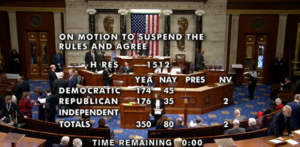
The House on Thursday passed the final $858 billion version of the fiscal year 2023 National Defense Authorization Act (NDAA) with a bipartisan 350 to 80 vote. The annual defense policy legislation now heads over to the Senate, which is likely to vote on the bill next week. "This bill represents compromise after months of hard work with colleagues on both sides of the aisle and in both chambers of Congress. Whatever our disagreements may be, there’s a lot to…

 By
By 











